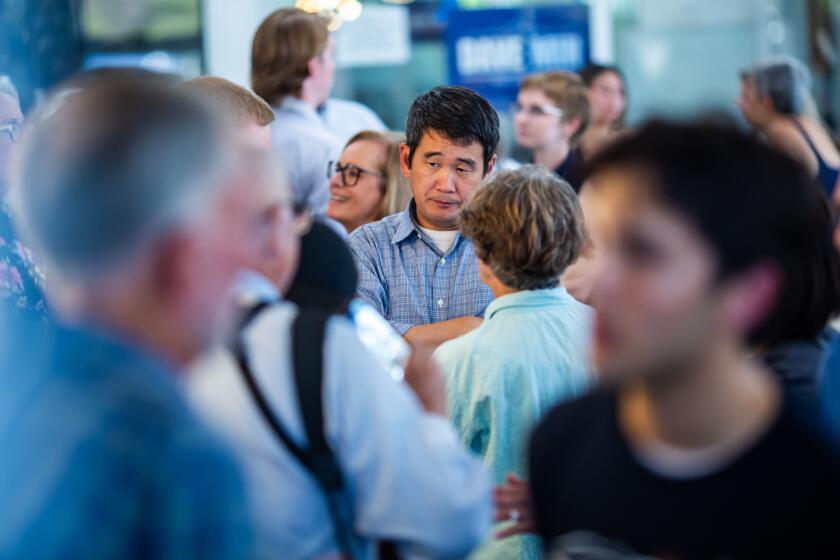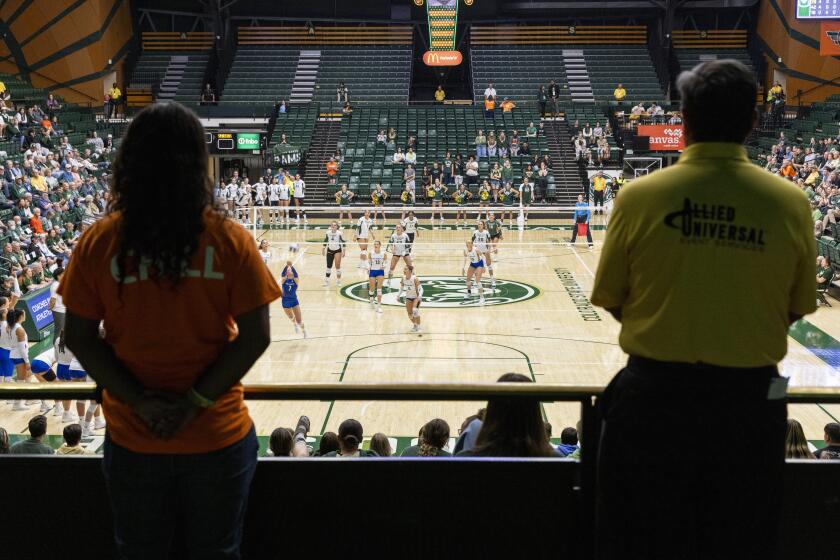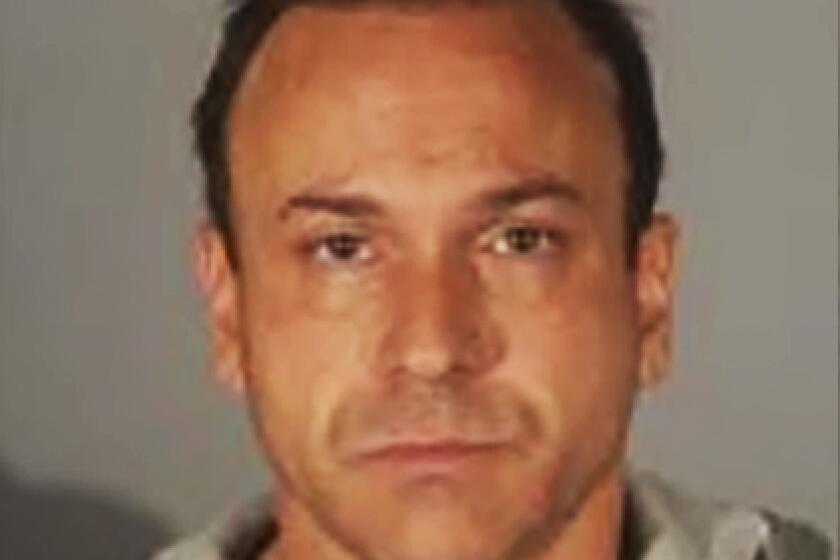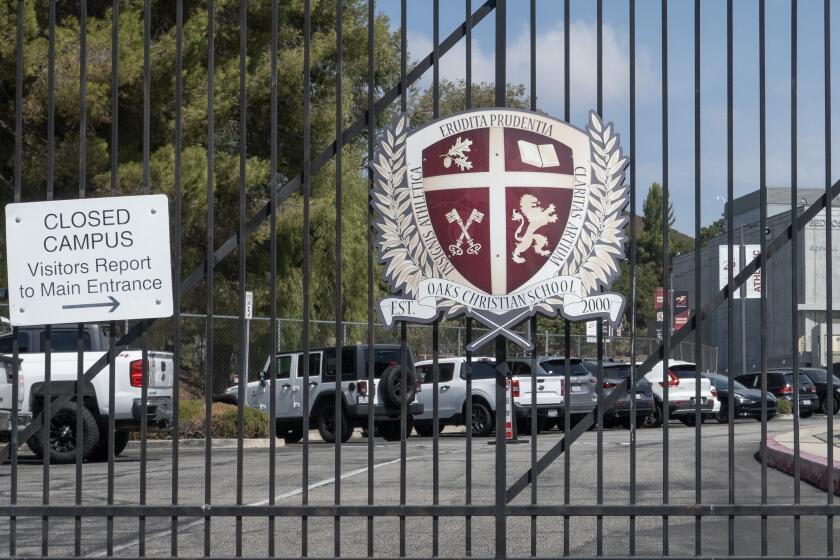Store Owners to Fight Restrictions on Reopening : Business: Korean American activists plan to lobby for a state law that would override Los Angeles regulations on liquor outlets destroyed during the riots. The legislation has been on hold at the mayor’s request.
In the wake of last week’s state Supreme Court decision leaving intact the controversial restrictions Los Angeles imposed on liquor stores after the 1992 riots, Korean American market owners and their supporters are organizing a campaign to help enact a state law to overcome their plight.
The days of “smiling at politicians” and donating money to them without asking anything in return are gone, said Korean American attorney William Min. What the local Korean American community must do now, Min said, is adopt the “American way” and lobby politicians to get Assembly Bill 1974 passed in the state Senate.
The measure, which was approved in the Assembly last year, would exempt liquor store owners whose businesses were destroyed during the riots from a range of requirements, including the hiring of full-time security guards.
At Mayor Richard Riordan’s request last August, the bill was placed on inactive status in the Senate. It would take 27 votes to reactivate AB 1974 and 21 to pass it, according to Joseph Ahn, an aide to Assemblyman Paul Horcher (R-Diamond Bar), who introduced the legislation.
In asking Horcher to put the measure on hold, Riordan said, “Our new Administration does not take its responsibilities lightly and we commit to you that the city will do everything within its power to amicably resolve this issue.”
This week, Korean American community leaders accused the mayor of not keeping his promise.
“Riordan’s request was just a political move formulated by his advisers to take out the steam from AB 1974 after it was adopted by the state Assembly,” said Hyong Sik Koh, a board member of the Korean American Legal Advocacy Foundation, which challenged the city restrictions.
But Riordan spokesman David Novak said the mayor has made “a strong, good-faith effort to balance the needs of the business community with the needs of the community,” adding that he is still working on the issue.
Jerry Yu, executive director of the Korean American Coalition, said a local solution cannot be found because the issue has taken on racial overtones.
But a solution is feasible in Sacramento, he said, because politicians outside the Los Angeles area view the liquor store issue differently. Preventing store owners from reopening their businesses is “unfair--maybe even unconstitutional,” Yu said. Such restrictions by city officials “amount to the taking of people’s property without just compensation,” he added.
Karen Bass, head of the Community Coalition for Substance Abuse Prevention and Treatment, said her organization will join with other groups throughout the state to defeat the Horcher bill. The coalition had pushed for imposing the regulations to deal with what it considered an overabundance of liquor stores.
At a strategy meeting earlier this week, Jae Yul Kim, president of the Korean American Grocers’ Victims Assn., asked younger Korean Americans to help.
“We cannot write letters in English, we are not proficient in English to lobby politicians,” Kim said in Korean.
Yu, who missed the meeting, said later that the Korean American Coalition, whose members are second-generation Korean Americans or from the “1.5 generation” (those born in Korea but reared in America), will do everything it can to help.
The city’s conditions are so stringent that thus far, the grocers association said, only 10 of 175 Korean-owned stores that had been licensed to sell liquor have been able to reopen.
Stephen Cho, a certified public accountant who is president of the Korean American Relief Fund, which collected $9 million from Koreans in the United States, Korea and Japan to help riot victims, said the store owners made a mistake because they were politically naive.
“We should have combined the legal challenge with a political campaign,” said Cho, whose organization has spent $130,000 on legal costs.
Lawyers for Korean American shopkeepers had argued that the city had gone beyond its authority in regulating liquor sales, which are under the purview of the state. But the 2nd District Court of Appeal ruled in city’s favor in March, saying the permits were aimed only at controlling undesirable conditions around the liquor stores, not at any prohibition of liquor sales. The state Supreme Court let the lower court decision stand by refusing to grant a hearing.
Charles Paek, whose family is in the process of moving into an apartment because their Cerritos home was foreclosed on, said he cannot express the abandonment riot victims feel.
“We live in tears every day,” he said.
His son, David, who saw his family’s store go up in flames on TV on the first night of the riots, said many of the complaints about liquor stores are unwarranted.
“Our store, like so many others owned by Korean Americans, was more than a liquor store,” he said. “We sold everything people needed--milk, diapers, you name it. We even cashed checks.”
Korean Americans say that for city officials to contend that the new regulations were needed to control the safety and health hazards that had cropped up around liquor stores is placing the blame on the wrong people.
“These problems in South-Central were built up over the last 30 years,” Yu said. “Many of these local black politicians allowed this to occur. It’s not fair to place the burden of these problems on the shoulders of the current group of store owners.”
The city issued a requirement that the owners of liquor stores that had been destroyed or badly damaged in the riots obtain new permits before reopening.
The decision, which almost exclusively affected small Korean American businesses, meant that owners had to invest in substantial improvements in store security and sanitation. New rules for garbage removal and lighting were imposed, along with limits on business hours in some locations, and a mandate that stores pay for full-time, licensed security guards.
Hong Soo Kim, who returned to South-Central earlier this year, says city restrictions are killing him. “I’m on the verge of bankruptcy,” Kim said. “Is this what city officials want?”
More to Read
Sign up for Essential California
The most important California stories and recommendations in your inbox every morning.
You may occasionally receive promotional content from the Los Angeles Times.










